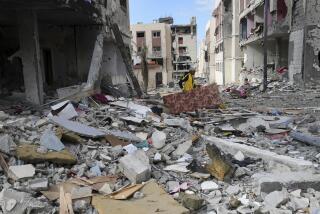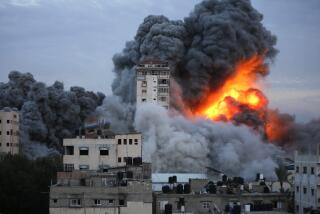Iraq Hiding Arms Data on Computers Made in America
- Share via
VANCOUVER, Canada — To conceal its deadliest arms from U.N. weapons inspectors, Iraq has increasingly turned to computers, including American brands sold to Baghdad since the end of the 1991 Persian Gulf War in violation of international sanctions, according to U.S. officials and U.N. diplomats.
Iraqi scientists and defense officials are now using predominantly Western-made computers for two critical functions:
* To transfer data from bulky papers to small disks that they can easily disperse, making the information difficult for U.N. weapons-inspection teams to track.
* For research and development in all four categories of weapons Iraq has been forbidden from keeping under terms of the U.N. resolution ending the war--nuclear, chemical and biological weapons and long-range missiles.
“This is more and more the focus of UNSCOM inspectors,” said an inspector with the U.N. Special Commission on Iraq (UNSCOM) who recently concluded his tour in the country. The inspectors are overseeing the dismantling of Iraq’s weapons of mass destruction.
U.N. sources refused to disclose the brand or the quantity of U.S.-manufactured computers, except to say they make up a significant percentage now in use in Iraq.
“These are not garden-variety computers that you can go down to Radio Shack and buy. This requires specialized equipment and programs only available in certain places,” said a former U.S. diplomat briefed on the issue.
Most of the U.S. equipment was probably purchased through third parties to circumvent U.S. companies, which would be more rigorous in monitoring such illegal sales, U.N. and U.S. sources said. Under the terms of the U.N.-ordered embargo, Iraq is allowed to buy only humanitarian goods such as basic foodstuffs, medical supplies and educational materials.
Iraq’s use of computers reflects a key way Baghdad has managed to drag out for more than six years a process originally envisioned to take a matter of months.
“The Iraqis claim they have destroyed all their papers on weapons of mass destruction. And to some extent that may be true. But what they’ve done is transfer information, research or inventory to computers,” a U.N. diplomat said. “UNSCOM is now pursuing this avenue very vigorously.”
Weapons inspectors refer to the issue as the “Oliver North problem,” a reference to the former Reagan administration official who shredded sensitive documents involving the Iran-Contra affair, only to have the information uncovered in a computer system.
The shift to computers has forced the U.N. teams’ search to focus less on the kind of trunkloads of papers found a couple of years ago on an Iraqi chicken farm and more on high-tech equipment.
“The days of looking for warehouses filled with bombs and germs are basically over. That part of the problem existed in the early 1990s, but we think that material has virtually all been uncovered,” said a senior U.S. official. “What we’re worried about now is the retention of data and the ability to regenerate and reproduce that material.”
The weapons inspector added, “You can really bring a stack of papers down to a couple of disks.”
Because of shifting tactics, computer specialists have become an ever more important component of the inspection teams, U.S. and U.N. sources say. Their work often involves digging into hard drives and unearthing material that was erased after being transferred to disks.
The use of high-tech equipment also underscores how Baghdad continues to keep pivotal data beyond the reach of the United Nations. The regime of President Saddam Hussein is widely suspected of using the three-week gap while U.N. inspectors were gone to further disperse data on disks, the sources said.
Iraq has used computers, for example, to work on nuclear warhead designs, U.S. and U.N. officials say. “It’s a real serious concern for us that they’re making such calculations. It’s also a reason we’re not anxious to close the file on any category” of weapons, said another well-placed U.N. diplomat.
French and Russian officials have recently suggested closing the file on one or more of the four categories of weapons as U.N. inspectors certify that the arms have been discovered and dismantled. The proposal is an attempt to give Iraq a sense of light at the end of the sanctions tunnel.
In a meeting of the U.N. weapons commission Saturday, the panel’s Russian member, Gennady Gatilov, was rebuffed when he proposed the changes. Instead, a report issued by the commission Saturday repeated earlier findings that while Iraq is close to meeting U.N. requirements on nuclear weapons and long-range missiles, there is still important information missing.
Some U.S. experts are concerned that Iraq may manage to retain pivotal data on disks that they can resume work on as soon as inspectors back off.
Baghdad has also used computers for its ballistic missile program, to simulate missile projections and to adjust design parameters, the sources say. Iraq is, for example, allowed to work on short-range missiles, but the work could be adapted for long-range missiles, U.N. diplomats said Saturday.
The use of computers also reflects the way Iraq uses its limited resources to modernize its military capability rather than address humanitarian issues, U.S. and U.N. officials pointed out.
Wright, a Washington-based reporter, was traveling with Secretary of State Madeleine Albright. Times staff writer Craig Turner at the United Nations contributed to this report.
* LOCAL IRAQI UNITY: Iraqi Americans are coming together as a result of the West’s standoff with Baghdad. B3
More to Read
Sign up for Essential California
The most important California stories and recommendations in your inbox every morning.
You may occasionally receive promotional content from the Los Angeles Times.









